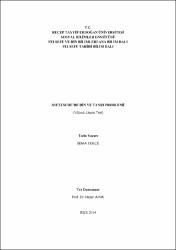Nietzsche'de din ve tanrı problemi
Abstract
Bu tezin amacı, Nietzsche'nin "Tanrı Öldü" sözünün arka planında var olan din eleştirisini ayrıntılı bir şekilde ele almak, Nietzsche'yi böyle bir düşünceye sevk eden atmosferi araştırmak ve onun insanlığı kurtarma çabasını gözler önüne sermektir. Nietzsche, 19. Yüzyılın sorunlarıyla hesaplaşmaya giren bir filozof olarak karşımıza çıkmaktadır. Çağının tüm değerlerini sil baştan yeniden oluşturma çabasında olan Nietzsche'ye göre hem Hıristiyan düşüncesi hem de pozitivist düşünce toplumu sürü haline getirmiştir. Çünkü her iki düşünce de insanı birtakım değerlerle aldatmış ve toplumu çöküşe doğru sürüklemiştir. Manevi değerlerin çökmesiyle birlikte Tanrı'nın bile bir fonksiyonu kalmayınca insan kocaman bir boşluğun ortasında yapayalnız kalmıştır. İşte Nietzsche bu durumu fark ederek insanlığı kurtarma misyonunu kendisine yüklemiş ve kurtuluşu üstün insan'da görmüştür. The purpose of this theses is; to handle there religion critics preciesely, whichexist in the background of Nietzsche's daying "God is dead", to search the atmosphere that dispatched Nietzche into such a thought and to capture his effort to save the humanity. Nietzsche appears to philosopher who settles up with the problems of 19th century. According to Nietzsche, who han been in an effort of restructuring all values of his age olloveragain, both the christianity conception and positivist conception herds the society. Because both of these conception deceived the human with some certain values and dragged the society in to corruption. With the corruption of moral values, the human was left completely alone in the middle of nothing wheneven God had no function anymore. Therefore Nietzsche had realized this situation and shouldered the reposnsibility of saving humman and had seen the salvation in "Above-human" (übermensch, overman)


















